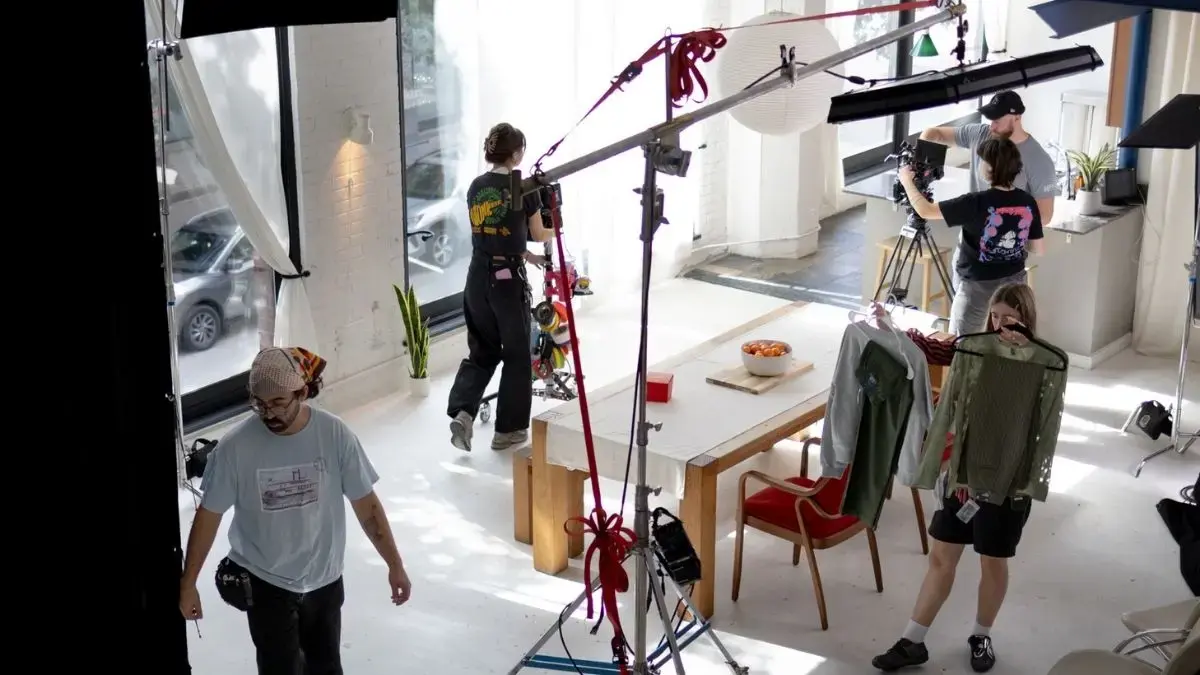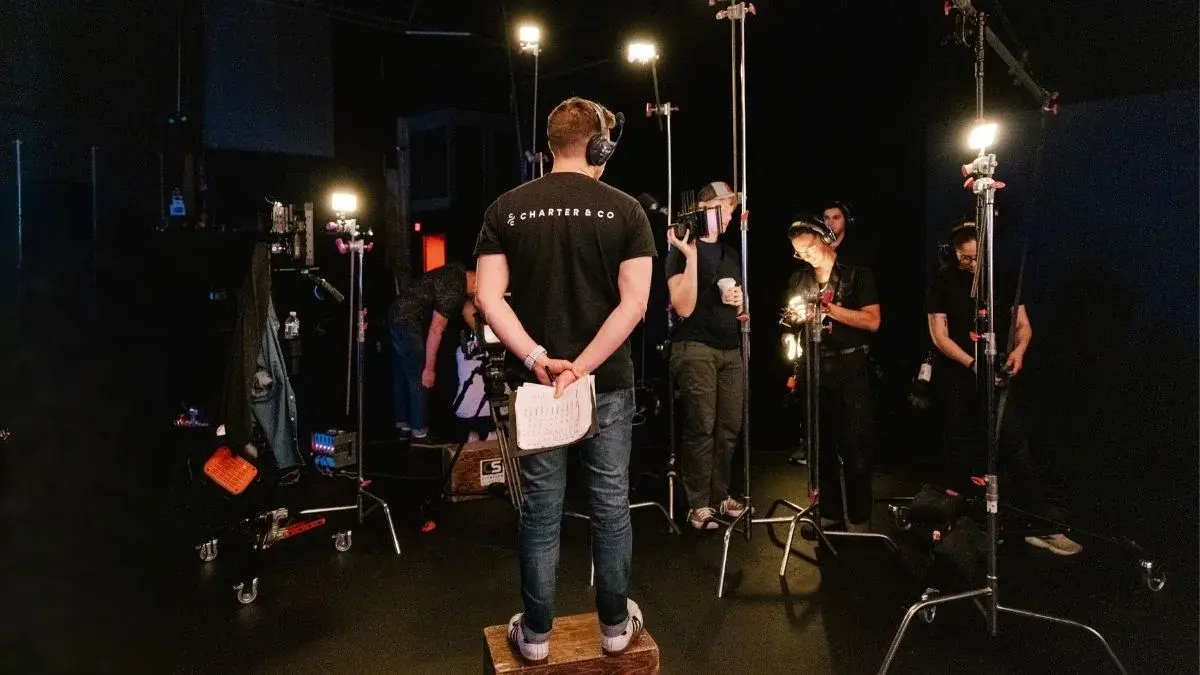Corporate vs. Small Business Video Production in Chicago
With close to 10 million residents, the Chicago area has an expansive population of potential customers and clients for your business. Video content...
▶ Video Strategy & Discovery
A video marketing strategy will keep your production cohesive and on schedule.
▶ Creative Treatments, Scripts & Storyboards
Bring your vision to life with professional scriptwriting and storyboarding services.
▶ Production Preparation
Prepare for your corporate video with professional video production services.
▶ Full Service Filming Days
Discover how Charter & Co can help you bring your vision to life through expert on-set filming services.
▶ Video Editing, Color Grading & Sound Design
Elevate your video marketing with Charter & Co’s expert video editing and post-production services.
▶ Motion Graphics
Captivate audiences with videos, ads, and social media that include high-quality animations.
▶ Licensed Music & Voiceovers
Elevate your videos with high-quality music licensing and voiceover services.
▶ Distribution Strategy & Advertising Support
Get your content noticed with a comprehensive video distribution strategy.
▶ Everything Video Marketing
Video marketing resources: What it is, why it matters, and how to do it.
▶ Everything Video Production
Your ultimate guide to video production resources: Tips and tricks for creating masterful videos.
▶ Blog
Helpful Blog resources for all of your video production and marketing needs
7 min read
Charter & Co August 19, 2025

If you’re looking for a video production company, Chicago is a great place to start. It’s one of the nation’s most dynamic cities for video production, offering world-class talent, diverse locations, and creative infrastructure. Whether you’re launching a campaign, producing branded content, or building an ongoing video strategy, choosing the right Chicago video production company can make or break your project’s success.
Chicago is home to over 2.7 million people, with the city and its surrounding metro coming in at over 9 million. It’s the third-largest city behind New York City and Los Angeles, so it's no surprise that, like those two, it's home to a robust video production market.
Aside from having a massive population, there are several other reasons why Chicago stands out in video marketing. It boasts a strong talent pool of actors, directors, cinematographers, editors, and production crews, thanks to institutions like The Second City and Steppenwolf Theatre Company, as well as schools like DePaul University and the School of the Art Institute of Chicago.
As a result of this talent, there’s already an established TV and film infrastructure in the city. Shows like The Bear and Chicago PD film here on soundstages like Cinespace Chicago Film Studios and throughout the city’s diverse locations. The diversity is another element that brings video production to Chicago — you can go from a gritty industrial zone to a historic neighborhood to sleek downtown with just a few minutes’ drive.
Because of all of this, Chicago is home to state-of-the-art production houses that offer a range of specializations. Some cover the entire production process, while others focus on specific areas, such as pre- or post-production. You’ll also find those that specialize in particular types of video projects, like:
But why choose a video production company in Chicago over one in NYC or LA? Those in the Midwest will probably find it more convenient, but it ultimately comes down to one key factor: cost. Chicago video production companies offer competitive production costs for the same high standard of work. Plus, Illinois offers film tax credits, which adds an incentive to film in the state.
Choosing the right Chicago video production company is critical for a smooth production process and a polished final product that meets your marketing campaign needs. You need to understand which aspects of the production process are most important and vet all potential partners by reviewing their portfolios and customer testimonials.
Being cinematic doesn’t just refer to footage; you probably don’t need your brand video to look like it comes from the world of Lord of the Rings or Avatar. Cinematic quality also refers to polish, storytelling, and production value.
Look for companies with portfolios that demonstrate strong cinematography, lighting, color correction, and sound design in their projects, as well as the ability to integrate components like motion graphics, VFX, or animation if you need it. Focus on those that prove the creative director has strong storytelling skills and a strong creative strategy.
But even stunningly cinematic videos will fail if they don’t reflect your brand’s tone, values, and goals. When reviewing portfolios, look for companies that reflect the tone, style, and emotion you want. Find companies that can adapt their aesthetic to fit different brands, not just ones that create the same type of video for every client.
You could find the most creative video production company in the city, but it won’t do you any good if they miss deadlines or can’t communicate. You need a company that maintains professionalism throughout the creative process. Some good indicators of professionalism include:
Having a producer or project manager on the team who keeps everything running smoothly is a big plus, as these folks are specifically trained to handle bumps in the road.
A good video marketing partner works within your budget and timeline and sets reasonable project expectations early. You don’t want a company that pushes your budget or timeframe to expand the scope.
Look for a team that is willing to be honest about what your budget and timeframe allow. It also helps if they can scale production up or down and have experience with managing tight turnarounds without sacrificing the quality of the final product.
Your production company should provide you with a clear understanding of potential production bottlenecks. They also need to provide you with a realistic production schedule as well as a clear breakdown of line items, including creative fees, production equipment rental, editing and revisions, etc.
Defining your marketing campaign objectives before hiring a video production company is the foundation for successful collaboration, effective storytelling, and measurable results. Without clear direction, even the most talented production team will struggle to meet your expectations.
A video without a clear strategic purpose is nothing but noise. Your goals determine the style, tone, format, and distribution of the video. When creating a strategy, you need to define three key factors:
These factors will help you determine the right format and what creative elements to include. It gives the video direction beyond simple aesthetics and ties it to your larger marketing campaign.
Your budget and the plausible scope of your ambitions are directly linked. Unrealistic expectations can lead to friction in the production team, production delays, and disappointing results. To prevent this from happening, you need to define:
Determining your budgets and wants beforehand lets you filter out vendors early and helps companies understand your project's restrictions. If you’re not sure what your budget should be, try asking for estimates based on your project goals.
Unrealistic deadlines lead to rushed decisions, limited creativity, and increased costs. Before choosing a vendor, you’ll need to consider:
When you establish a timeline in advance, you can look specifically for vendors that can meet your desired schedule. It also allows the pre-production team to properly schedule tasks like location scouting or script writing, as well as allocate time to post-production touch-ups and feedback during the editing process.
A request for proposal (RFP) is going to be your most powerful tool for finding the right Chicago video production company, especially if you’re investing heavily in your marketing campaign.
An RFP is a document that outlines your project’s requirements and invites potential vendors to submit proposals outlining their project ideas and an estimate of costs. It clarifies your expectations for both creative and logistical deliverables and prevents miscommunication. It also allows you to compare different vendors side-by-side.
There are multiple components you’ll need to include in your RFP. Some of the most important include:
Your RFP should be concise but thorough. Leave some room for creativity so the production companies can showcase their ideas.
Partnering with a Chicago company that offers video production and video marketing services is a strategic move that sets you up for future successes. The best relationships are collaborative, efficient, and creatively aligned. They should evolve alongside your brand and deliver consistent value.
Discovery and consultation are where your partnership first begins. This phase ensures that you’re aligned on goals, values, and the production process.
Expect a strategic discussion that goes over your business goals, target audience, and brand voice. You’ll also need to find out if the company is compatible with your budget and timeline, the scope of services they offer, and what sort of experience they have in your industry or with the type of content you want to create.
Think of this step like a creative interview. They’ll need information about your project, and you’ll need information about how they can best meet your video production needs.
Knowing whether a company can handle your timeline, budget, and overall needs is key to finding a vendor. However, if you’re looking for a partnership, you’ll also want to consider:
Sometimes, you won’t know the answers to these questions until you’ve worked with a company. If you feel that the relationship isn’t working, it’s okay to move on to another vendor.
Long-term success isn’t just about the execution of your video project; it’s about a creative partnership and brand stewardship.
To foster a long-term partnership, focus on consistent collaboration. Set regular strategy check-ins, share information about upcoming campaigns early, and ask for creative insight. Establish post-project reviews so you can evaluate their creative impact and the efficiency of production. Once a partnership is established, you can also review past videos together to see what’s working and what needs a refresh.
A trusted partner, like Charter & Co, can often find blind spots that you might miss. Our award-winning videos have led us to partner with many businesses and help them launch successful video marketing campaigns. Contact us today to see how our Chicago-area video expertise can help you reach your marketing goals.

With close to 10 million residents, the Chicago area has an expansive population of potential customers and clients for your business. Video content...

Many mid-market businesses in Chicago are actively looking for the right video partner to level up their video marketing strategy. However, not all...

Marketing development funds (MDF) can support various marketing objectives for Microsoft Partners, including campaigns that may not have otherwise...